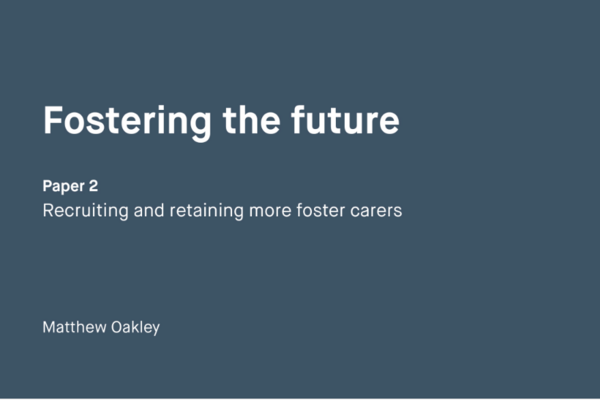It's good to be pushed in our thinking about how to improve foster care, so reports like the second one on fostering from Matthew Oakley for the Social Market Foundation are always welcome. Foster care works well for most children, most of the time - let’s not forget that.
There's much I could say about the recommendations of Matthew’s second report, and we’ll discuss it with our independent fostering agency (IFA) members, but I suggest he might want to take a wider view about how foster carers are supported. Whilst there are foster carers who have not been supported in the way that they need in order to help them develop a positive relationship with the child living with them, there are lots of examples of good practice. One of the reasons that most IFAs retain foster carers so well (one of the themes of the report) is because of how they support them.
To focus on one example from the report - 'respite' - the term itself is problematic, suggesting to children that they are a problem for the foster carer who might need to get away from them. There are other terms we could all agree to use - stay over/sleepover, time off, a break for children, though ‘short breaks’ can mean something else so it all gets very confusing! I don’t think the report has quite grasped who these breaks are for (child? foster carer?), or the extent to which they should be more personalised for each child and their foster carer (and can't be standardised). I could write another blog about the extent to which personalisation of care for children gets lost in overarching policies and procurement.
The rights and needs of children and the foster carers they live with are inextricably entwined. It's a challenge to balance how we think about foster care as both a caring role and a practitioner/professional (and these words themselves can be problematic). Some of this is what makes foster care so unique, and what makes the experience of foster care different for each child and each foster carer. But the relationship between child and foster carer, and how we (social workers, local authorities, agencies) support and nurture this relationship, is arguably the single most important thing.
We have to start to engage in a significantly more evidence-based public debate than we have in recent times. And I would include lived experience and professional experience within a broad definition of evidence. Of course, not every view needs to be backed up by a randomised control trial to be believed. On the other hand, though, adults who share personal views that they can’t back-up need to be clear that this is what they are. In my view, too much of the public dialogue about ‘care’ and the ‘care system’ has been characterised by unbalanced and unsubstantiated negativity and blame. When I hear people shouting about how terrible the system is (and how this is all someone else’s fault), I think about the children and young people in care who are hearing them. Prospective foster carers and prospective social workers also hear them. So, let’s get the balance right - foster care works well for most children, most of the time - let’s not forget that.





